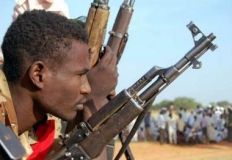Darfur rebel groups demand changes to draft peace pact
April 30, 2006 (ABUJA) — Two Sudan rebel groups said on Sunday they would refuse to sign a proposed Darfur peace agreement in its current form, throwing into doubt two years of talks to end fighting which has killed tens of thousands.
 “We are not going to accept this document for signature unless there are fundamental changes made to the document,” Ahmed Tugod, the Justice and Equality Movement (JEM) chief negotiator, told Reuters.
“We are not going to accept this document for signature unless there are fundamental changes made to the document,” Ahmed Tugod, the Justice and Equality Movement (JEM) chief negotiator, told Reuters.
The African Union (AU) set midnight (2300 GMT) on Sunday as a deadline to conclude the talks and said it would not reopen substantial negotiations on the proposed text.
The government of Sudan said earlier it was ready to sign the plan drafted by the AU mediators, but one of the factions of the Sudan Liberation Army (SLA) said it would not sign the proposed agreement unless its demands were met in full.
“If the proposal does not include all our demands we will not sign,” Seif Haroun, spokesman for the SLA faction led by Minni Arcua Minnawi, told reporters.
It was not immediately known what the position of the other SLA faction — a third rebel group involved in the fighting — was on the 85-page draft peace settlement.
All sides were expected to state their positions at a session at 2200 GMT in front of mediators at a no-frills hotel on the dusty outskirts of the Nigerian capital Abuja.
“It is extremely difficult to accept this document because we cannot sell it to our people,” Tugod said.
Before JEM rejected the deal, Sam Ibok, head of the AU mediation team, called the situation “very fluid”.
The draft agreement was the result of tough negotiations on security, wealth-sharing and power-sharing that have dragged on for two years while the conflict in Darfur has escalated.
Jan Pronk, U.N special envoy for Sudan, said missing the deadline by a few hours to fine-tune a deal was an option, but a major new round of talks was not.
“If the government is willing to sign, after all the wrongdoings of the past and of today … those parties that will not sign will be held responsible and there will be political consequences,” he said.
Those might include sanctions imposed by the U.N. Security Council, which has already imposed a travel ban and a freeze on assets abroad on four Sudanese — two from the government side and two rebel leaders — suspected of abuses in Darfur.
WASHINGTON MARCH
While the talks continue, several thousand Americans, led by religious leaders, entertainers and politicians, marched in Washington to urge the United States to halt “genocide” in Sudan’s Darfur region.
“Darfur deserves to live. We are its only hope,” Nobel Peace Prize winner and Holocaust survivor Elie Wiesel told the crowd that converged on the National Mall in Washington.
Other speakers at the rally included Illinois Democratic Sen. Barak Obama and actor George Clooney, who visited Darfur last week.
The rebels have a series of objections on issues ranging from political representation to compensation and plans for their forces to be disarmed.
The rebels took up arms in early 2003 in ethnically mixed Darfur, an arid region the size of France, over what they saw as neglect by the Arab-dominated central government.
Khartoum used militias, known locally as Janjaweed and drawn from Arab tribes, to crush the rebellion. The fighting has killed tens of thousands of people while a campaign of arson, looting and rape has driven more than 2 million from their homes into refugee camps in Darfur and neighboring Chad.
All sides have continued fighting despite a 2004 ceasefire, according to the AU, which has 7,000 peacekeepers in Darfur, and aid groups say violence prevents them from delivering food and medicine to tens of thousands of refugees.
The AU’s peace plan requires the government to disarm Janjaweed militias it has used as a counter-insurgency force before the rebels lay down their weapons and diplomats say Khartoum’s acceptance of this is a major breakthrough.
“The government … wishes to confirm its decision to formally accept this document and its readiness to sign it,” said a statement from Majzoub al-Khalifa, head of the government’s negotiating team.
The government said it had decided to sign despite “reservations”, and diplomats said the biggest of those centered on disarmament arrangements.
“What this (agreement) means, in effect, is that the government has to disarm the Janjaweed at a time when the rebels will still have their forces fully deployed, albeit in defensive positions,” said a diplomat closely involved in the talks.
Observers said a trade-off was still possible whereby the government would grant the rebels a few concessions in exchange for a watering down of the Janjaweed disarmament provision.
But decision-making is an arduous process for the rebels as they are split into two movements and three factions with a history of infighting.
In the United States, President George W. Bush has called the violence “genocide” and endorsed a series of “Save Darfur” rallies planned for later on Sunday to put pressure on Khartoum to stop the violence.
(Reuters)
